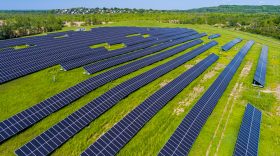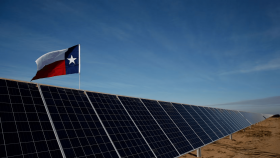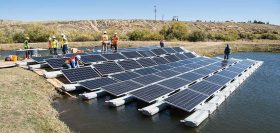Photovoltaic (PV) modules produce DC electricity, and how that DC power is converted to grid-quality AC is one of the most hotly debated subjects in the industry. Up until 2008 when Enphase released their first micro-inverter, large “string” inverters connecting multiple solar panels were the industry standard. Now, inverter technology has advanced to the point that small micro-inverters are being integrated into the panels themselves, allowing each panel to make its own AC power. Unlike field installed micro-inverters, a factory installed, hardwired DC to AC component eliminates any onsite DC wiring and simplifies permitting and installation, but will they catch on?
LG is one of the companies that includes a new AC panel among their newest offerings. According to Ellen Kim, senior vice president of Energy Solutions at LG Electronics USA: “Our most recent innovation from the LG Mono X module series is the Mono X ACe, which is designed to maximize AC-power output to deliver premium installation flexibility for installers and easy monitoring for the end users. Its optimized design includes a ‘plug and play’ feature, which improves the overall safety and speed of rooftop installations by minimizing the connectivity labor, reducing cable work and increasing its energy yield. This makes installing and using solar modules simpler than ever.”
LG’s website claims that their MonoX ACe reduces thee installation time of 12 panels from 70 to 41 minutes. Particularly on large utility-scale arrays, this could mean a significant savings in installation costs. Ellen Kim continued: “Solar panels give homeowners a path toward energy independence, while offering convenience and exceptional functionality. LG’s advanced new energy-efficient technology in our latest modules provides consumers with the opportunity to become a more sustainable member of society, in addition to delivering long-term cost savings.”
LG’s MonoX Ace carries the Underwriters Laboratories (UL) certification, but not all panels marketed with an inverter package inverter do. Consumers, installers and inspectors all need to be aware of the difference between a panel and inverter package and a “true AC panel”, as specified by the U.S. National Electric Code (NEC). It describes an AC panel as: “a complete, environmentally protected unit consisting of solar cells, optics, inverter and other components, exclusive of tracker, designed to generate AC power when exposed to sunlight.” A true AC module will be certified by a Nationally Recognized Testing Laboratory (NRTL) and requires that they meet UL standards 1741 and 1703, which cover both the panel itself as well as the integrated inverter. It is important to make sure that the product you are choosing is listed specifically as an AC panel, evaluated to UL 1741 and carry an AC nameplate rating. Texas-based SolarBridge Technologies, California’s Andalay Solar, and a handful of other companies are banking on these integrated panels to be the next wave in grid-tied PV technology.
The beauty of the AC panels is that they eliminate the need for any DC wiring on the job site and therefor eliminate a lot of confusion, both for electricians and electrical inspectors. Also, grounding is simplified greatly. This “plug and play” wiring, along with expanded capabilities for system monitoring and management have a lot of appeal, but will this translate into widespread adoption and strong sales?
There are obvious downsides to the AC panel concept as well. Micro-inverter reliability has been a problem. This means that micro-inverter failure means changing the entire unit, panel and all. Even if a micro-inverter performs as expected, the panel will probably last longer than the inverter. Not to mention that upgrading inverters and re-using panels really isn’t an option, either. There are definitely some advantages to keeping the inverter and panel separate. Despite these issues, we can expect to see a lot more AC panels coming onto the market in the next few years.






